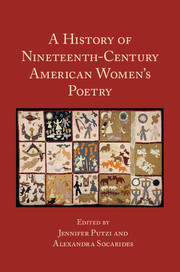Book contents
- Frontmatter
- Contents
- List of Illustrations
- List of Contributors
- Acknowledgments
- Introduction: Making History: Thinking about Nineteenth-Century American Women's Poetry
- PART I 1800–1840, AMERICAN POESIS AND THE NATIONAL IMAGINARY
- PART II 1840–1865, UNIONS AND DISUNIONS
- PART III 1865–1900, EXPERIMENT AND EXPANSION
- 17 Women Poets and American Literary Realism
- 18 Verse Forms
- 19 Braided Relations: Toward a History of Nineteenth-Century American Indian Women's Poetry
- 20 Frances Harper and the Poetry of Reconstruction
- 21 “hear the bird”: Sarah Piatt and the Dramatic Monologue
- 22 Women Writers and the Hymn
- 23 Women Poets, Child Readers
- 24 Emma Lazarus Transnational
- 25 The Creation of Emily Dickinson and the Study of Nineteenth-Century American Women's Poetry
- Suggested Further Reading
- Index
19 - Braided Relations: Toward a History of Nineteenth-Century American Indian Women's Poetry
from PART III - 1865–1900, EXPERIMENT AND EXPANSION
Published online by Cambridge University Press: 21 January 2017
- Frontmatter
- Contents
- List of Illustrations
- List of Contributors
- Acknowledgments
- Introduction: Making History: Thinking about Nineteenth-Century American Women's Poetry
- PART I 1800–1840, AMERICAN POESIS AND THE NATIONAL IMAGINARY
- PART II 1840–1865, UNIONS AND DISUNIONS
- PART III 1865–1900, EXPERIMENT AND EXPANSION
- 17 Women Poets and American Literary Realism
- 18 Verse Forms
- 19 Braided Relations: Toward a History of Nineteenth-Century American Indian Women's Poetry
- 20 Frances Harper and the Poetry of Reconstruction
- 21 “hear the bird”: Sarah Piatt and the Dramatic Monologue
- 22 Women Writers and the Hymn
- 23 Women Poets, Child Readers
- 24 Emma Lazarus Transnational
- 25 The Creation of Emily Dickinson and the Study of Nineteenth-Century American Women's Poetry
- Suggested Further Reading
- Index
Summary
Perhaps the first thing that needs saying about nineteenth-century poetry by American Indian women from within the boundaries of what is now the United States is both the least and the most interesting thing to say: that it is there. Except for the relatively recent and still-emerging discussions of the poetry (and other writings) of Jane Johnston Schoolcraft, Olivia Ward Bush, and Ann Plato, poetry by nineteenth-century American Indian women has received almost no scholarly attention and almost never shows up in the classroom. This essay identifies all the known poems by nineteenth-century American Indian women and reads them both as individual poems and collectively, as a related group of poems.
I know of thirteen American Indian women who wrote poems in the nineteenth century. Here they are chronologically, with “B” indicating a boarding-school student and “P” indicating a pseudonymous poet:
Jane Johnston Schoolcraft, Ojibwe, approximately 50 poems, 1815–1840
Ann Plato, Long Island or Southern New England Algonquian, 20 poems, 1840–41
Corrinne, Cherokee, “Our Wreath of Rose Buds,” 1854, B, P
Lily Lee, Cherokee, “Literary Day Among the Birds,” 1855, B, P
Lelia, Cherokee, “We have faults, to be sure,” 1855, B, P
Emma Lowrey Williams, Cherokee, “Life,” 1855, B
Wenonah, Cherokee, “Thanksgiving,” 1886, P
Elsie Fuller, Omaha, “A New Citizen,” 1887, B
Olivia Ward Bush, Montaukett, 14 poems, 1890–1900 (and more poems later)
Cora Snyder, Seneca, “The Frequent Showers of April,” 1895, B
Melinda Metoxen, Oneida, “Iceland,” 1896, B
Zitkala-Ša/Gertrude Simmons, Sioux, “Ballad” and “Iris of Life,” 1897–1898 (and several poems about 20 years later)
Mabel Washbourne Anderson, Cherokee, “Nowita, the Sweet Singer,” 1900
From the array of poets and poems on this list, which presumably does not represent all the poems that were written, several patterns emerge. The most prolific poets – Schoolcraft, Plato, and Bush – open and close this historical sequence. Beyond those three poets, the record includes eleven poems by ten different women, six of them Cherokees and six of them boarding-school students at the time of their writing. At least five of the six Cherokees attended the Cherokee Female Seminary, either at the time of writing or earlier. And four poems, all by Cherokees, including three of the boarding-school poems, are pseudonymous (assuming that first names without family names are pseudonyms).
- Type
- Chapter
- Information
- A History of Nineteenth-Century American Women's Poetry , pp. 313 - 328Publisher: Cambridge University PressPrint publication year: 2016



